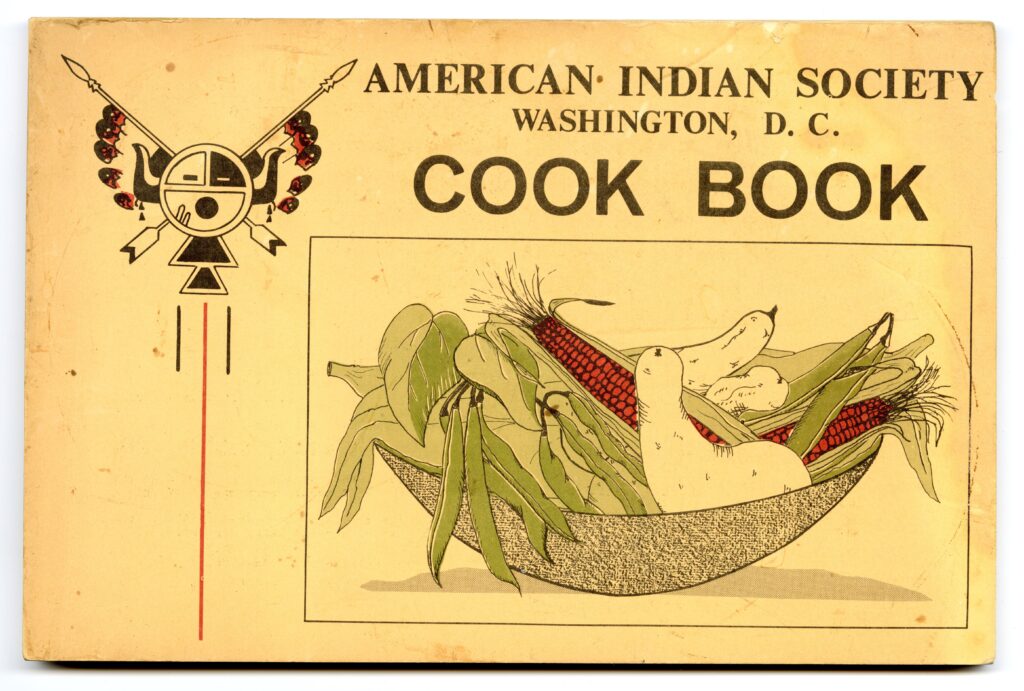This series will serve as an introduction to newly available collections and new stories at the DC History Center. The materials featured here are available for reference upon request. To make an appointment at the Kiplinger Research Library, reach out to library staff via email library@dchistory.org.
August is finally behind us as we slip into the welcoming embrace of fall. As we move into the harvest season, the nights lengthen and the temperature cools. For many of us, this is a time to settle in with our communities, spending time with family and friends, and sharing food. Food brings people together, creates common ground, and nurtures connection. A recent acquisition at the DC History Center, the inaugural cookbook of the American Indian Society (AIS) of Washington, DC explores the rich cultural tradition of Indigenous foodways through a collection of community sourced recipes.

AIS DC was founded in 1966 with the goal of representing as many tribes as possible within the Washington, DC metropolitan area. The Society’s mission is to honor Indigenous cultures and traditions while promoting the values of friendship, generosity, courage, and respect. AIS seeks to enrich the public understanding of the diversity and richness of Indigenous life, and provide charitable, civic, and social programs that contribute to the advancement and well-being of its members.
The AIS DC 1974 cookbook is a collaborative community creation, containing recipes, photographs, illustrations, poetry, and prayers. Over the course of a year, AIS gathered recipes from within the Washington, DC area and independently published the cookbook in December 1975. Its content spans the entire country, endeavoring to include recipes from every place that Native Peoples lived. Beginning with an Arapaho invocation, the work is dedicated to both the Indigenous creators of the preparation techniques and dishes, and the future generations who will put these methods to use.
The cookbook is divided into chapters on meats, fish, poultry and eggs, vegetables and salads, soups and stews, breads, desserts and drinks. The collection spans favorites such as tuna casserole, to regional dishes and traditional cuisine such as reindeer swiss steak. Sections titled “Food Hints” and “Simple Home Remedies” provide quick food preparation and consumption tips and identify helpful herbs. One entry reads “Late fall squash – bury small squashes in the ashes at the campfire and eat before you go to bed.” Another details the properties of Jewelweed, a poison ivy repellent which can be found growing near poison ivy patches. Recipes that involve foraging often include tips of where to forage, at what time of year, and sometimes the consequences of gathering too late in the season, such as in this entry for Land Cress:
“Land Cress
Pick land cress early in the spring before it blossoms. Don’t wait too long because it gets too bitter to eat. Wash under running water. Boil with pieces of salt pork or pork side meat. Salt and pepper to taste.
Bertha Jennings – Ottawa”
Each recipe in the AIS DC cookbook was submitted by an individual, resulting in a variety of styles and sometimes including short insights or personal anecdotes. In the recipe for Fried Squirrel, author Grace Thorpe of the Sac and Fox Nation includes a quick tip and story about her father:
“Watch the squirrels and pick the ones that eat good things. My dad watched them and shot the ones that ate a lot of pecans in Oklahoma. Skin them, roll in flour with salt and pepper and fry them like chicken 15-20 minutes on each side. Delightful. Grace Thorpe – Sac & Fox”
These personal connections tie traditional recipes to unique family customs and lived experiences, crafting a text that is both utilitarian and story rich. This particular copy of the AIS DC cookbook was stored in the donor’s kitchen, who cooked recipes from its pages, saying that the book “shows its purpose.” Its folds and stains lovingly and accidentally applied, act as a map of the cookbook’s use and life.
Objects like cookbooks, archival materials, and community creations are embodied by the intention of the people who created them. The DC History Center’s collections house several independent cookbooks.
Here are a few examples:
-
- The Brigham-Cline Family Cookbook, 1988 (P 6850)
- The Washington Romance Writers Cookbook, 2003 (MS 0727)
- Cookbook of Regional Recipes of the Italian Cultural Society of Washington DC, 1977 (P 6854)
The American Indian Society Washington DC Cookbook is available for reference at the Kiplinger Research Library, by appointment.
Autumn Kalikin is Collections Manager of the DC History Center.